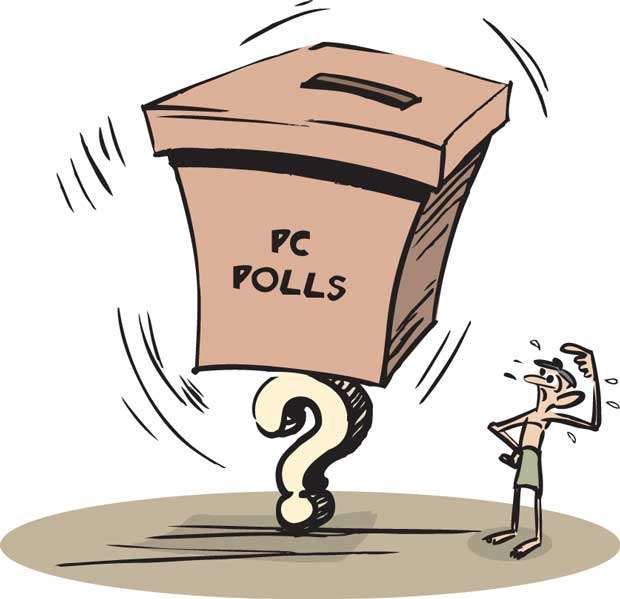28 Aug 2018 - {{hitsCtrl.values.hits}}

One cannot understand why the government, knowing well that the majority members of the Parliament would not vote for the report on delimitation of provincial council wards, presented it in the House for approval. And it is even hilarious that the Provincial Councils and Local Government Minister Faiszer Musthapha who presented the report to Parliament for approval, had himself voted against it.
Now that the report has been rejected by the Parliament, a committee which is to be appointed by the Speaker under the chairmanship of the Prime Minister will review it and report to the President within two months. And if the President accepted that report, then the delimitation process would be deemed to be approved by the Parliament and implemented. Therefore, according to the procedure, once the Members of the Parliament reject the report in the House they would not have any say in re-evaluating it, before it is implemented.
Had the report been accepted by the Parliament, elections for three provincial councils that stand dissolved would have to be held forthwith. With the minister presenting a report for which even he did not vote, the allegation by the Opposition that the government was hell bent on postponing the elections, is being vindicated. There are a lot of complaints by various political parties on the demarcation of ward boundaries by the Delimitation Commission headed by former Surveyor General Kanakaratnam Thavalingam. Reasons for these complaints may be real or perceived, as the interests of political parties vary. Mr. Thavalingam, meanwhile stands by the report saying it is “hundred percent correct.”
In fact, the real issue lies not in the delimitation of wards, but in the new electoral system as a whole which necessitated the delimitation process. The country has already experimented the new system in last February with regard to the local government elections and it created a mess in local bodies. It was such a muddle that even former President Mahinda Rajapaksa who was the de-facto leader of the winning party, the Sri Lanka Podujana Peramuna had stated that the new system was so chaotic and has to be changed. This sentiment had been echoed by President Maithripala Sirisena as well, later.
The new system doubled the number of members in local councils causing a heavy burden on the public coffers. Besides, wining parties in many local bodies could not institute the councils for weeks and in some councils for months by electing their chairmen and deputy chairmen, as the Opposition in those councils had been larger than the ruling parties. It was a result of doing away with the bonus seat system and the cut-off point for the political parties for their eligibility. And the provision for the female representation had also created confusion, compelling some political parties in some local bodies to appoint women for all the slots they had been entitled to in the respective councils.
No doubt, the women representation in peoples’ representative bodies such as the LG councils, provincial councils and the Parliament is a progressive concept. But the method that has been put in practice is not workable due to the conflict between the loftiness of the idea and the psyche of the constituency. No individual or political party is to blame for the messy mixed electoral system that has been accepted now to be implemented at the provincial and local government level, as the concept was mooted during a ten-year long Parliamentary Select Committee process and adopted by the Parliament with majority votes. Yet, the leaders of the main political parties are not satisfied with what is in hand after it was put to test for the first time in February. Nevertheless, they are attempting to continue with it now at the provincial level as well.
In short, democracy was distorted in local level with the votes received by parties not corresponding to the councils they won, while winning parties in some cases being deprived of the right to rule the councils, due to the kind of mixed electoral system we have. Then, what is the purpose of trying it out again at provincial level? Either we have to refine the mixed system or go back to the old Proportional Representation (PR) system.
27 Oct 2024 6 hours ago
27 Oct 2024 9 hours ago
27 Oct 2024 27 Oct 2024
27 Oct 2024 27 Oct 2024
27 Oct 2024 27 Oct 2024